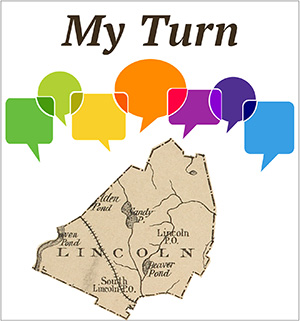By Barbara Slayter
As a Lincoln resident, I am deeply appreciative of this community’s responses to the brutal murder of George Floyd in May 2020. Lincolnites both unofficially and officially sprang into action to help the town create and sustain a welcoming, inclusive, and diverse culture.
The First Parish in Lincoln, where I am a member, launched its Racial Justice Advocates program, a vigorous program of book discussions, videos, documentaries, and lectures on topics such as James Baldwin’s works, housing inequities in the suburbs along the Route 128 corridor, and New England’s role in the slave trade. Its Racial Justice Newsletter has become a regular and widely available source of information about activities pertaining to social justice, both within the First Parish community and beyond.
Among the most inspiring undertakings was Lincoln Public Schools’ 21-day AIDE (Antiracism, Inclusion, Diversity, Equity) Challenge, which offered an amazing compilation of penetrating questions about biases and stereotypes, colonialism, systemic racism, white privilege, and all forms of social injustice. These were accompanied by an extraordinary range of resources — all available with the click of the mouse — from lengthy documents such as Brown University’s report on its various entanglements with slavery, to brief video clips on any topic at hand. The town was invited to join in, and indeed we did, with lively discussions of the questions posed and materials offered. Lincoln teachers and administrators put incredible effort into this 21-day challenge and into making it accessible not only to the schools but also to the entire community.
Now, as the culture wars deepen, I am ever more appreciative of Lincoln’s schools and apprehensive about our nation’s trajectory. According to recent data, 18 states across the country restrict education on race, banning books from the library and discussions in the classroom. I winced as I read just recently that a teacher in an AP English class in South Carolina has been forbidden by the local school board to have her students read Ta-Nehisi Coates’ Between the World and Me, a compelling letter from a Black father to his son about the risks he faces being a Black youth in America. This work, read by a group at the First Parish, was a vital resource in sharpening our understanding of racial dynamics in this country.
It is with this thought in mind that I recognize how fortunate we are to have Lincoln educator and author Ray Anthony Shepard in our midst. Ray has devoted his professional life to educating America’s young adults and also children about the struggles for racial justice. In his most recent book, A Long Time Coming, just published this August, he does so through story and free verse, written in snappy short poems with sharp imagery that pulls the reader into the thoughts, emotions, hopes, predicaments, setbacks, and dangers faced by the protagonist. He offers biographies of six individuals from 18th-century Ona Judge to 21st-century Barak Obama, revealing the arc of reform as a torch that lights the way to Black liberty as it is metaphorically passed from generation to generation (see my review of the book in the latest issue of the Lincoln Chipmunk).
In addition to the deep respect for these six resilient figures elicited by his poetry, and the new perspectives offered on their lives, Shepard provides insights based on his own experiences having been brought up in Missouri where his maternal grandfather was enslaved. He is very much aware that this book may soon be on a “banned book” list of those that make white students “feel discomfort, guilt, or anguish.”
In my view, it is the persistence and dedication of authors and educators who, like Ray with his long-term vision and his hopes for the future, provide all of us with the best opportunity to bring to fruition a less divided, more inclusive, and fairer America. Make sure that you, your children, and grandchildren get to read it!
“My Turn” is a forum for readers to offer their letters to the editor or views on any subject of interest to other Lincolnites. Submissions must be signed with the writer’s name and street address and sent via email to lincolnsquirrelnews@gmail.com. Items will be edited for punctuation, spelling, style, etc., and will be published at the discretion of the editor. Submissions containing personal attacks, errors of fact, or other inappropriate material will not be published.

Excellent article!
Amen.
A great article! Thank you, Barbara.
And I meant to say “Yay, Ray!” too.